外研版(2019)选择性必修 第四册 Unit 4 Everyday economics Developing ideas Reading 课件(共32张)
文档属性
| 名称 | 外研版(2019)选择性必修 第四册 Unit 4 Everyday economics Developing ideas Reading 课件(共32张) |
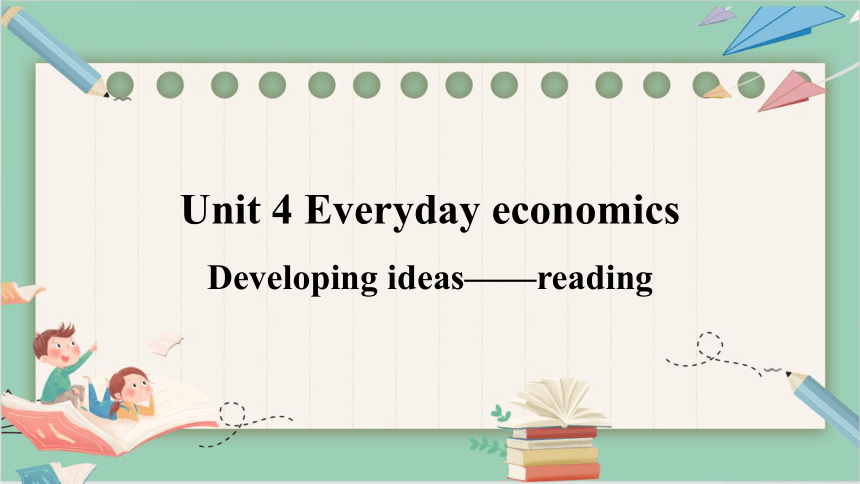
|
|
| 格式 | pptx | ||
| 文件大小 | 1.1MB | ||
| 资源类型 | 教案 | ||
| 版本资源 | 外研版(2019) | ||
| 科目 | 英语 | ||
| 更新时间 | 2025-05-02 00:00:00 | ||
图片预览

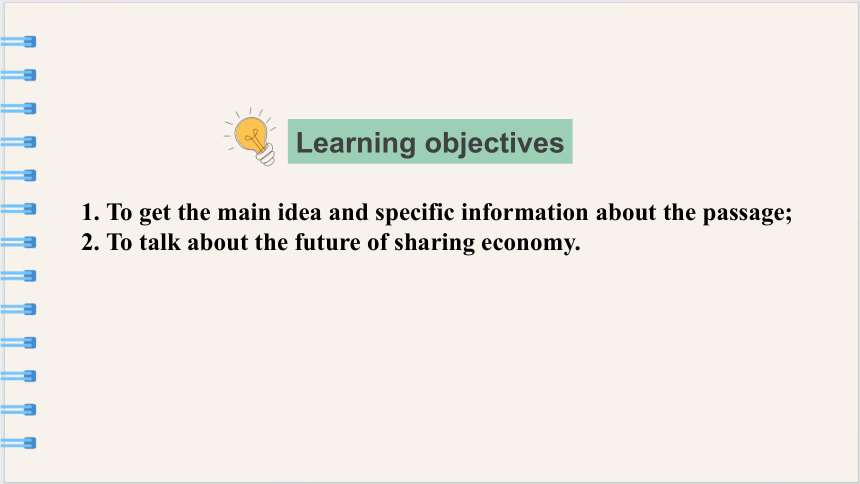
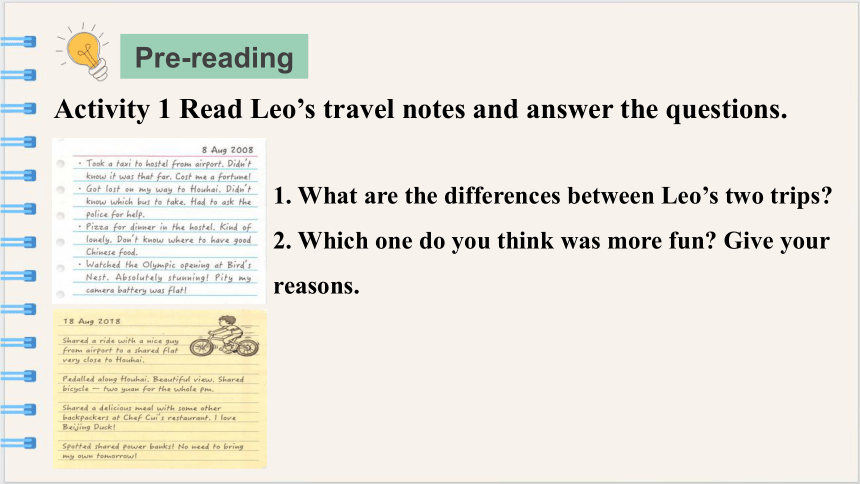


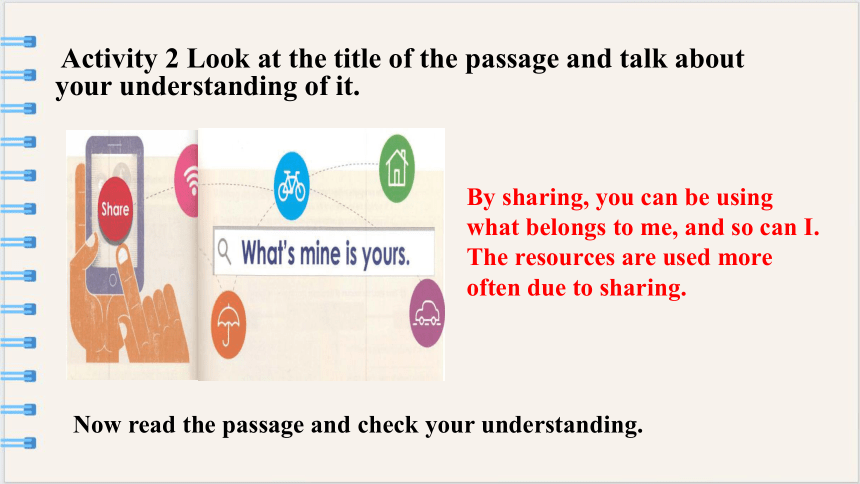
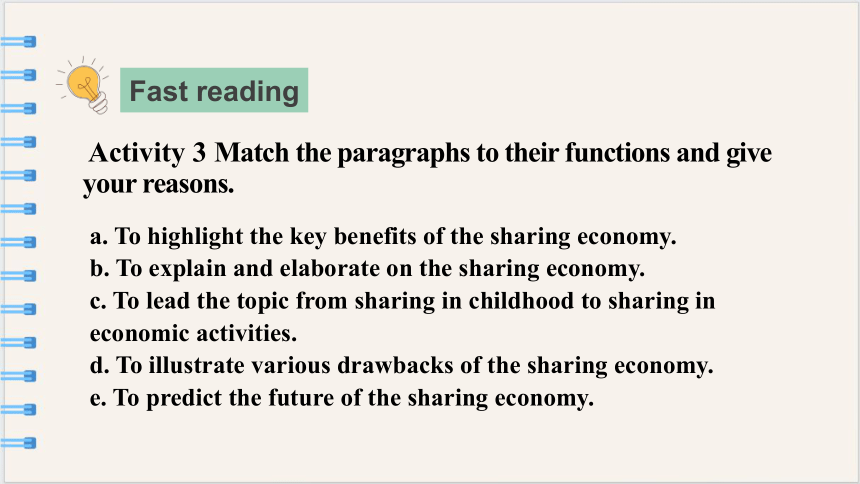
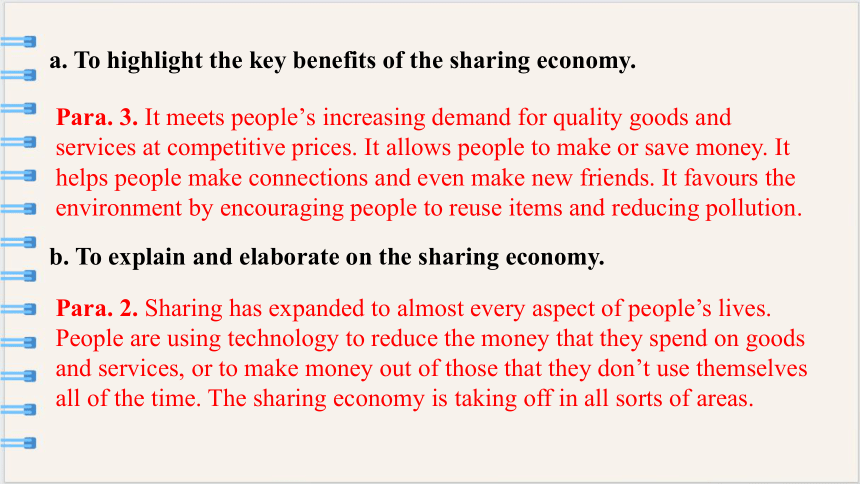
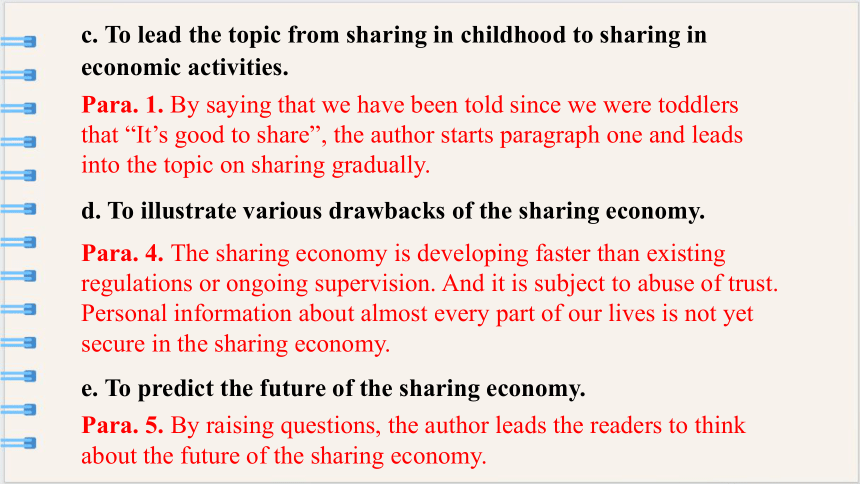
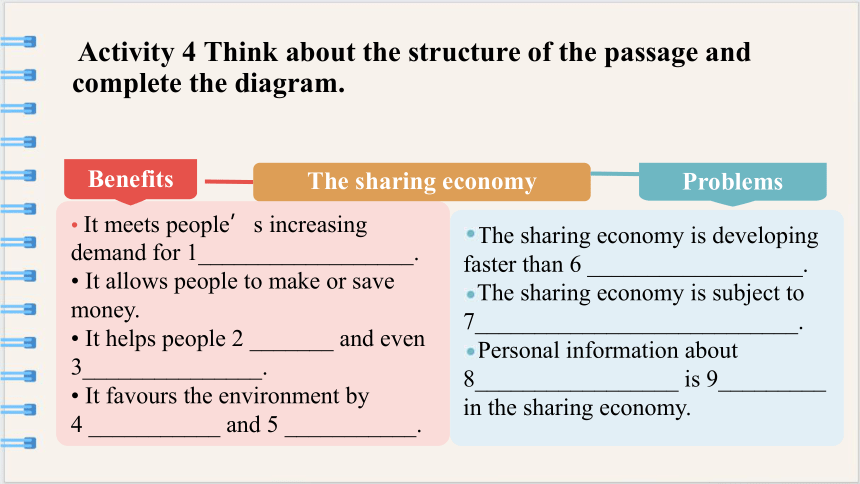
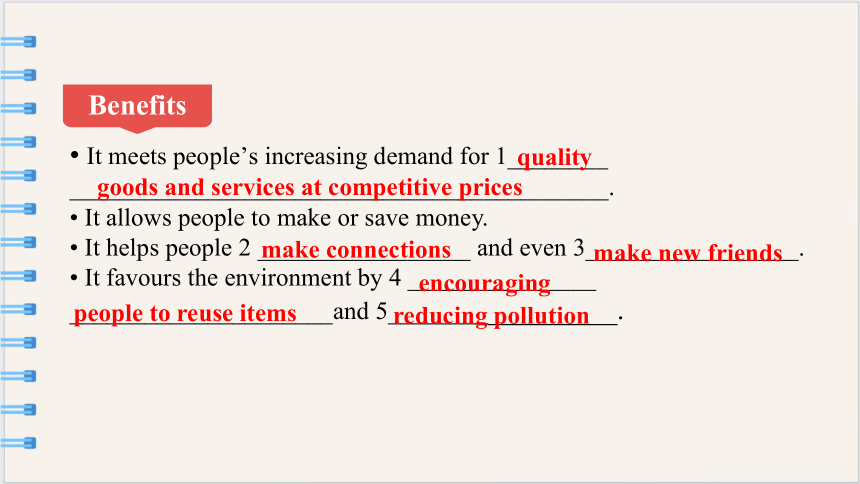
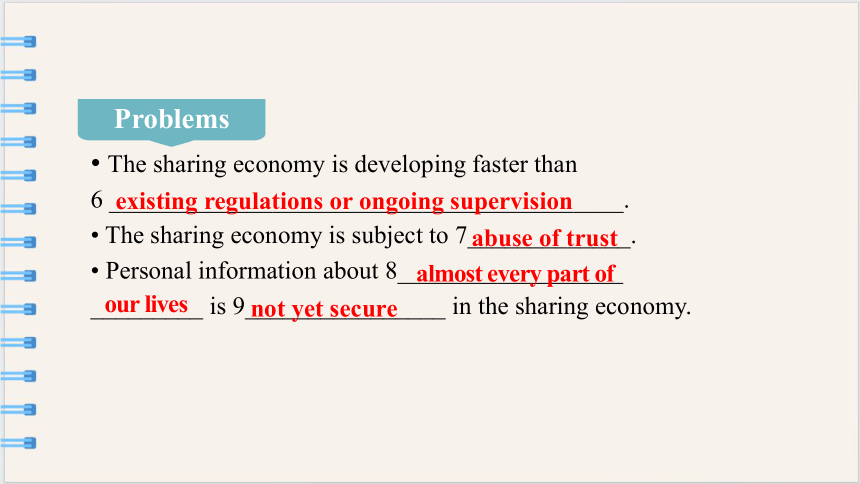
文档简介
(共32张PPT)
Developing ideas——reading
Unit 4 Everyday economics
Learning objectives
1. To get the main idea and specific information about the passage;
2. To talk about the future of sharing economy.
1. What are the differences between Leo’s two trips
2. Which one do you think was more fun Give your reasons.
Activity 1 Read Leo’s travel notes and answer the questions.
Pre-reading
1. What are the differences between Leo’s two trips
1) In 2008, Leo took a taxi to the hostel from the airport and it cost him a fortune! In 2018, the trip from the airport to the city centre was much cheaper because it was a shared ride.
2) In 2008, Leo stayed in a hostel, while in 2018 he stayed in a shared flat.
3) In 2008, Leo didn’t know how to get to Houhai, while in 2018 he had a nice trip around Houhai by riding a shared bicycle.
4) In 2008, Leo could only have a pizza in the hostel alone and he didn’t know where to have good Chinese food. In 2018 he shared a delicious meal of Chinese cuisine with some other backpackers at Chef Cui’s restaurant.
5) In 2008, Leo had a battery problem with his camera. He didn’t have this problem in 2018, because he could use the shared power banks.
2. Which one do you think was more fun Give your reasons.
One possible answer: I think the second one is more fun. During his second trip, Leo had a more wonderful experience by sharing so many things. He tasted delicious Chinese food, enjoyed a beautiful view but spent less money. That was brilliant!
Activity 2 Look at the title of the passage and talk about your understanding of it.
By sharing, you can be using what belongs to me, and so can I. The resources are used more often due to sharing.
Now read the passage and check your understanding.
a. To highlight the key benefits of the sharing economy.
b. To explain and elaborate on the sharing economy.
c. To lead the topic from sharing in childhood to sharing in economic activities.
d. To illustrate various drawbacks of the sharing economy.
e. To predict the future of the sharing economy.
Activity 3 Match the paragraphs to their functions and give your reasons.
Fast reading
a. To highlight the key benefits of the sharing economy.
Para. 3. It meets people’s increasing demand for quality goods and services at competitive prices. It allows people to make or save money. It helps people make connections and even make new friends. It favours the environment by encouraging people to reuse items and reducing pollution.
b. To explain and elaborate on the sharing economy.
Para. 2. Sharing has expanded to almost every aspect of people’s lives. People are using technology to reduce the money that they spend on goods and services, or to make money out of those that they don’t use themselves all of the time. The sharing economy is taking off in all sorts of areas.
c. To lead the topic from sharing in childhood to sharing in economic activities.
Para. 1. By saying that we have been told since we were toddlers that “It’s good to share”, the author starts paragraph one and leads into the topic on sharing gradually.
d. To illustrate various drawbacks of the sharing economy.
Para. 4. The sharing economy is developing faster than existing regulations or ongoing supervision. And it is subject to abuse of trust. Personal information about almost every part of our lives is not yet secure in the sharing economy.
e. To predict the future of the sharing economy.
Para. 5. By raising questions, the author leads the readers to think about the future of the sharing economy.
Activity 4 Think about the structure of the passage and complete the diagram.
It meets people’s increasing demand for 1__________________.
It allows people to make or save money.
It helps people 2 _______ and even 3_______________.
It favours the environment by
4 ___________ and 5 ___________.
The sharing economy is developing faster than 6 __________________.
The sharing economy is subject to 7___________________________.
Personal information about 8_________________ is 9_________ in the sharing economy.
The sharing economy
Benefits
Problems
It meets people’s increasing demand for 1________
___________________________________________.
It allows people to make or save money.
It helps people 2 _________________ and even 3_________________.
It favours the environment by 4 _______________
_____________________and 5_________________.
quality
goods and services at competitive prices
make connections
make new friends
encouraging
people to reuse items
reducing pollution
Benefits
The sharing economy is developing faster than
6 _________________________________________.
The sharing economy is subject to 7_____________.
Personal information about 8__________________
_________ is 9________________ in the sharing economy.
existing regulations or ongoing supervision
abuse of trust
almost every part of
our lives
not yet secure
Problems
A two-sided argumentative essay investigates a topic by presenting collated information and evaluating evidence from both sides. It should close by wrapping up the argument. It could conclude in favour of the arguments, or simply stay neutral with no particular preference.
Learning to learn
1. What is the author’s attitude towards the sharing economy
2. What do you think are other benefits and problems
of the sharing economy How could we address the potential problems
3. What are your experiences of the sharing economy Share these experiences with the class.
4. How do the two reading passages in this unit help deepen your understanding of new economic trends
Intensive reading
1. What is the author’s attitude towards the sharing economy
The author acknowledges the benefits of the sharing economy, but he also takes concern about the problems of it. The author is also curious about the future of the sharing economy.
2. What do you think are other benefits and problems of the sharing economy How could we address the potential problems
One possible answer:
I think by sharing, we can make better use of the resources. But there are still problems, such as the difficulty with management. The government should put in place strict laws to monitor and punish those who violate the rules of sharing economy.
3. What are your experiences of the sharing economy Share these experiences with the class.
Once I made a trip to Yangshuo, in Guilin. I didn’t live in a hotel as usual but shared a house with a local family. The family were friendly and I got warm hospitality. The experience was quite different and I enjoyed it.
4. How do the two reading passages in this unit help deepen your understanding of new economic trends
One possible answer:
From the first reading passage, I realize that it is more than a good idea to start one’s own business. After learning the second reading passage, I know for sure that sharing is the new economic trend.
Activity 5 Work in groups. Talk about the future of the sharing economy.
Post-reading
1. Think about what will happen in the next 20 years as the world’s economy becomes ever more global and digital. Consider the following:
What will people be sharing next
How will they be sharing these things
What benefits will people get from sharing these things
What are the potential problems
2. Share your ideas with your group.
3. Present your group’s ideas to the class.
Now think about how the other groups’ ideas were different to your own and whether you agree with them.
1. expand v. ① 扩大,增加,增强(尺码、数量等)
Student numbers are expanding rapidly.
学生人数在迅速增加。
② 扩展,发展(业务)
We’ve expanded the business by opening two more stores.
我们增开了两个商店以扩展业务。
Language points
The collection comprises 327 paintings.
这部画册收有327幅画。
2. comprise v. ① 包括;包含;由……组成
② 是(某事物的)组成部分;组成;构成
同义短语:make up
Older people comprise a large proportion of those living in poverty.
在那些生活贫困的人中,老年人占有很大的比例。
也用作:be comprised of 同义短语:consist of
1. keep doing sth. ______________________
2. share sth. with sb. ______________________
3. take on ______________________
4. vary from ... to ... ______________________
5. a response to ______________________
6. at competitive prices ______________________
一直/持续做某事
和某人分享某物
呈现
对……的反应/回应
优惠的价格
从……到……不同/不等
7. do a further favour for ________________
8. as is often the case with ________________
9. take advantage of ________________
10. at the expense of ________________
11. be subject to ________________
12. the awareness of ________________
利用
以……为代价
更有助于
常遭受;有……倾向的
……的意识
通常就是这样
1. Taking it as an object of study, psychologists have published various papers stating that the behaviour of sharing is beneficial to setting up positive emotional bonding.
Paraphrase: Psychologists have done studies into the behaviour of sharing, and their various published papers show that sharing is good for building emotional connections between people.
本句中 state 为动词,意为 to formally say or write a piece of information or your opinion,和 say 或 write 相比,更强调正式程度。
be beneficial to 是固定搭配,意为 having a good effect on。
例如:Cycling is beneficial to both your health and the environment.
骑自行车对你的健康和环境都大有裨益。
Taking it as an object of study, psychologists have published various papers stating that the behaviour of sharing is beneficial to setting up positive emotional bonding.
2. The sharing economy is taking off in all sorts of areas.
Paraphrase: The sharing economy is becoming very successful in a short time in different areas.
本句中 take off 为固定搭配,意为 to suddenly start being successful。
例如:With the help of this man, his career took off.
在这个人的帮助下,他的事业腾飞了。
3. Yet, the technology to prevent such information from leaking or being stolen still needs improvement, and the awareness of potential risks is low among both service providers and users.
Paraphrase: However, the technology is not good enough to stop information from leaking or being stolen, and it must be improved. Neither service providers nor users are alert enough to the possible harmful results.
本句中 prevent ... from ... 为固定搭配,意为 to stop ... from ...。
例如:They were prevented from entering the site.
他们被阻止进入现场。
awareness 意为 knowledge or understanding of a particular subject or situation。
例如:He has no awareness of his mistake.
他没有意识到自己的错误。
4. Nonetheless, what is in no doubt is that the sharing economy is increasingly relevant to our daily lives as well as to the global economy.
Paraphrase: Even so, there is no doubt that the sharing economy is becoming more and more connected with not only our daily lives, but also the global economy.
本句中 nonetheless 意为 however / despite this fact,起到让步、转折的功能。
例如:Do not include any information that is not relevant to your topic.
不要包含任何和你的话题不相关的信息。
be relevant to 是固定搭配,意为 be directly related to。
Nonetheless, what is in no doubt is that the sharing economy is increasingly relevant to our daily lives as well as to the global economy.
Nonetheless, what is in no doubt is that the sharing economy is increasingly relevant to our daily lives as well as to the global economy.
what 引导主语从句
that 引导表语从句
what is ... is that ... 是两个名词性从句的组合,这样的结构既可以让表达更加简洁,避免头重脚轻的情况,还可以起到对主语和表语内容的强调作用。
1. Read the text again and again to have a better understanding of the sharing economy.
2. Write down your ideas about the future of the sharing economy.
Homework
Developing ideas——reading
Unit 4 Everyday economics
Learning objectives
1. To get the main idea and specific information about the passage;
2. To talk about the future of sharing economy.
1. What are the differences between Leo’s two trips
2. Which one do you think was more fun Give your reasons.
Activity 1 Read Leo’s travel notes and answer the questions.
Pre-reading
1. What are the differences between Leo’s two trips
1) In 2008, Leo took a taxi to the hostel from the airport and it cost him a fortune! In 2018, the trip from the airport to the city centre was much cheaper because it was a shared ride.
2) In 2008, Leo stayed in a hostel, while in 2018 he stayed in a shared flat.
3) In 2008, Leo didn’t know how to get to Houhai, while in 2018 he had a nice trip around Houhai by riding a shared bicycle.
4) In 2008, Leo could only have a pizza in the hostel alone and he didn’t know where to have good Chinese food. In 2018 he shared a delicious meal of Chinese cuisine with some other backpackers at Chef Cui’s restaurant.
5) In 2008, Leo had a battery problem with his camera. He didn’t have this problem in 2018, because he could use the shared power banks.
2. Which one do you think was more fun Give your reasons.
One possible answer: I think the second one is more fun. During his second trip, Leo had a more wonderful experience by sharing so many things. He tasted delicious Chinese food, enjoyed a beautiful view but spent less money. That was brilliant!
Activity 2 Look at the title of the passage and talk about your understanding of it.
By sharing, you can be using what belongs to me, and so can I. The resources are used more often due to sharing.
Now read the passage and check your understanding.
a. To highlight the key benefits of the sharing economy.
b. To explain and elaborate on the sharing economy.
c. To lead the topic from sharing in childhood to sharing in economic activities.
d. To illustrate various drawbacks of the sharing economy.
e. To predict the future of the sharing economy.
Activity 3 Match the paragraphs to their functions and give your reasons.
Fast reading
a. To highlight the key benefits of the sharing economy.
Para. 3. It meets people’s increasing demand for quality goods and services at competitive prices. It allows people to make or save money. It helps people make connections and even make new friends. It favours the environment by encouraging people to reuse items and reducing pollution.
b. To explain and elaborate on the sharing economy.
Para. 2. Sharing has expanded to almost every aspect of people’s lives. People are using technology to reduce the money that they spend on goods and services, or to make money out of those that they don’t use themselves all of the time. The sharing economy is taking off in all sorts of areas.
c. To lead the topic from sharing in childhood to sharing in economic activities.
Para. 1. By saying that we have been told since we were toddlers that “It’s good to share”, the author starts paragraph one and leads into the topic on sharing gradually.
d. To illustrate various drawbacks of the sharing economy.
Para. 4. The sharing economy is developing faster than existing regulations or ongoing supervision. And it is subject to abuse of trust. Personal information about almost every part of our lives is not yet secure in the sharing economy.
e. To predict the future of the sharing economy.
Para. 5. By raising questions, the author leads the readers to think about the future of the sharing economy.
Activity 4 Think about the structure of the passage and complete the diagram.
It meets people’s increasing demand for 1__________________.
It allows people to make or save money.
It helps people 2 _______ and even 3_______________.
It favours the environment by
4 ___________ and 5 ___________.
The sharing economy is developing faster than 6 __________________.
The sharing economy is subject to 7___________________________.
Personal information about 8_________________ is 9_________ in the sharing economy.
The sharing economy
Benefits
Problems
It meets people’s increasing demand for 1________
___________________________________________.
It allows people to make or save money.
It helps people 2 _________________ and even 3_________________.
It favours the environment by 4 _______________
_____________________and 5_________________.
quality
goods and services at competitive prices
make connections
make new friends
encouraging
people to reuse items
reducing pollution
Benefits
The sharing economy is developing faster than
6 _________________________________________.
The sharing economy is subject to 7_____________.
Personal information about 8__________________
_________ is 9________________ in the sharing economy.
existing regulations or ongoing supervision
abuse of trust
almost every part of
our lives
not yet secure
Problems
A two-sided argumentative essay investigates a topic by presenting collated information and evaluating evidence from both sides. It should close by wrapping up the argument. It could conclude in favour of the arguments, or simply stay neutral with no particular preference.
Learning to learn
1. What is the author’s attitude towards the sharing economy
2. What do you think are other benefits and problems
of the sharing economy How could we address the potential problems
3. What are your experiences of the sharing economy Share these experiences with the class.
4. How do the two reading passages in this unit help deepen your understanding of new economic trends
Intensive reading
1. What is the author’s attitude towards the sharing economy
The author acknowledges the benefits of the sharing economy, but he also takes concern about the problems of it. The author is also curious about the future of the sharing economy.
2. What do you think are other benefits and problems of the sharing economy How could we address the potential problems
One possible answer:
I think by sharing, we can make better use of the resources. But there are still problems, such as the difficulty with management. The government should put in place strict laws to monitor and punish those who violate the rules of sharing economy.
3. What are your experiences of the sharing economy Share these experiences with the class.
Once I made a trip to Yangshuo, in Guilin. I didn’t live in a hotel as usual but shared a house with a local family. The family were friendly and I got warm hospitality. The experience was quite different and I enjoyed it.
4. How do the two reading passages in this unit help deepen your understanding of new economic trends
One possible answer:
From the first reading passage, I realize that it is more than a good idea to start one’s own business. After learning the second reading passage, I know for sure that sharing is the new economic trend.
Activity 5 Work in groups. Talk about the future of the sharing economy.
Post-reading
1. Think about what will happen in the next 20 years as the world’s economy becomes ever more global and digital. Consider the following:
What will people be sharing next
How will they be sharing these things
What benefits will people get from sharing these things
What are the potential problems
2. Share your ideas with your group.
3. Present your group’s ideas to the class.
Now think about how the other groups’ ideas were different to your own and whether you agree with them.
1. expand v. ① 扩大,增加,增强(尺码、数量等)
Student numbers are expanding rapidly.
学生人数在迅速增加。
② 扩展,发展(业务)
We’ve expanded the business by opening two more stores.
我们增开了两个商店以扩展业务。
Language points
The collection comprises 327 paintings.
这部画册收有327幅画。
2. comprise v. ① 包括;包含;由……组成
② 是(某事物的)组成部分;组成;构成
同义短语:make up
Older people comprise a large proportion of those living in poverty.
在那些生活贫困的人中,老年人占有很大的比例。
也用作:be comprised of 同义短语:consist of
1. keep doing sth. ______________________
2. share sth. with sb. ______________________
3. take on ______________________
4. vary from ... to ... ______________________
5. a response to ______________________
6. at competitive prices ______________________
一直/持续做某事
和某人分享某物
呈现
对……的反应/回应
优惠的价格
从……到……不同/不等
7. do a further favour for ________________
8. as is often the case with ________________
9. take advantage of ________________
10. at the expense of ________________
11. be subject to ________________
12. the awareness of ________________
利用
以……为代价
更有助于
常遭受;有……倾向的
……的意识
通常就是这样
1. Taking it as an object of study, psychologists have published various papers stating that the behaviour of sharing is beneficial to setting up positive emotional bonding.
Paraphrase: Psychologists have done studies into the behaviour of sharing, and their various published papers show that sharing is good for building emotional connections between people.
本句中 state 为动词,意为 to formally say or write a piece of information or your opinion,和 say 或 write 相比,更强调正式程度。
be beneficial to 是固定搭配,意为 having a good effect on。
例如:Cycling is beneficial to both your health and the environment.
骑自行车对你的健康和环境都大有裨益。
Taking it as an object of study, psychologists have published various papers stating that the behaviour of sharing is beneficial to setting up positive emotional bonding.
2. The sharing economy is taking off in all sorts of areas.
Paraphrase: The sharing economy is becoming very successful in a short time in different areas.
本句中 take off 为固定搭配,意为 to suddenly start being successful。
例如:With the help of this man, his career took off.
在这个人的帮助下,他的事业腾飞了。
3. Yet, the technology to prevent such information from leaking or being stolen still needs improvement, and the awareness of potential risks is low among both service providers and users.
Paraphrase: However, the technology is not good enough to stop information from leaking or being stolen, and it must be improved. Neither service providers nor users are alert enough to the possible harmful results.
本句中 prevent ... from ... 为固定搭配,意为 to stop ... from ...。
例如:They were prevented from entering the site.
他们被阻止进入现场。
awareness 意为 knowledge or understanding of a particular subject or situation。
例如:He has no awareness of his mistake.
他没有意识到自己的错误。
4. Nonetheless, what is in no doubt is that the sharing economy is increasingly relevant to our daily lives as well as to the global economy.
Paraphrase: Even so, there is no doubt that the sharing economy is becoming more and more connected with not only our daily lives, but also the global economy.
本句中 nonetheless 意为 however / despite this fact,起到让步、转折的功能。
例如:Do not include any information that is not relevant to your topic.
不要包含任何和你的话题不相关的信息。
be relevant to 是固定搭配,意为 be directly related to。
Nonetheless, what is in no doubt is that the sharing economy is increasingly relevant to our daily lives as well as to the global economy.
Nonetheless, what is in no doubt is that the sharing economy is increasingly relevant to our daily lives as well as to the global economy.
what 引导主语从句
that 引导表语从句
what is ... is that ... 是两个名词性从句的组合,这样的结构既可以让表达更加简洁,避免头重脚轻的情况,还可以起到对主语和表语内容的强调作用。
1. Read the text again and again to have a better understanding of the sharing economy.
2. Write down your ideas about the future of the sharing economy.
Homework
